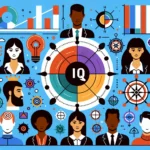The Intersection of High IQ and Effective Leadership: Unravelling the Connection
In the dynamic world of leadership, the significance of high intelligence quotient (IQ) is a subject that has sparked considerable debate. The role of a high IQ in leadership encapsulates a multi-dimensional influence on an individual’s capacity to navigate complex scenarios, devise strategic solutions, and steer organizations toward success. Leaders with high intellectual abilities are often viewed as proficient problem solvers, quick learners, and adept at abstract thinking.
Understanding IQ and Leadership Dynamics
Intelligence quotient (IQ) is a measure of an individual’s cognitive abilities in relation to their age group. Typically, it encompasses analytical thinking, logical reasoning, mathematical aptitude, and verbal skills. Leaders with a high IQ are often commended for their ability to assimilate information rapidly, analyze data effectively, and strategize with foresight.
The role of high IQ in leadership is crucial, as it equips leaders with the cognitive prowess to dissect intricate issues and generate innovative solutions. These individuals often stand out in their capability to understand and adapt to new information or changing environments swiftly, ensuring that their decision-making process is informed and rational.
High IQ and Strategic Problem-Solving
Exceptional leaders are recognized for their strategic problem-solving skills. A high IQ is instrumental for leaders as it enhances their ability to deal with complex challenges by identifying patterns and relationships that may not be immediately apparent. This fine-tuned perception allows leaders to anticipate potential roadblocks and orchestrate well-thought-out strategies to overcome them.
The cognitive competencies associated with a high IQ, such as exceptional memory and expansive knowledge bases, provide a solid framework for leaders to draw from when making critical decisions or navigating uncharted territory.
The Role of Emotion in High IQ Leadership
While a high IQ is undeniably an asset in the realm of leadership, emotional intelligence (EQ) is equally important. The interplay between IQ and EQ determines the effectiveness of a leader. High IQ leaders who also possess strong emotional intelligence are better able to comprehend the emotional dynamics within their teams, foster positive relationships, and inspire and motivate their followers.
In this light, the role of a high IQ in leadership should not be considered in isolation but rather in conjunction with the leader’s emotional acuity. The ability to combine analytical intelligence with empathy and social awareness is often what sets truly transformational leaders apart.
Innovation and Creativity: The Hallmarks of High IQ Leadership
Innovation lies at the heart of progress, and leaders with high IQs are typically at the forefront of creative problem-solving and pioneering advancements. Their aptitude for abstract thought allows them to conceive unique ideas and drive innovation within their organizations. This is essential for maintaining a competitive edge in today’s fast-paced global economy.
High IQ leaders are adept at fostering a culture of creativity and encouraging their team members to push beyond conventional boundaries. They understand that breakthroughs often occur at the intersection of disciplines; thus, they leverage their intellectual versatility to spur cross-functional collaboration.
Balancing High IQ with Practical Leadership Skills
Despite the advantages of a high IQ in leadership, it is essential to balance intellectual capability with practical leadership skills, such as communication, adaptability, and decisiveness. Leaders must be able to articulate their vision clearly, adapt their strategies in real-time, and make decisive moves when the situation calls for it.
An effective leader recognizes that while a high IQ can provide a solid foundation for superior leadership, it is the harmonious integration of cognitive and practical skills that leads to exemplary leadership and organizational achievement.
Conclusion
The role of a high IQ in leadership is multifaceted, contributing significantly to a leader’s analytical and strategic abilities while facilitating innovative and creative thinking. However, a high IQ is most impactful when harmonized with emotional intelligence and practical leadership skills. In the ever-evolving landscape of leadership, it is the synthesis of intellect, empathy, and hands-on capabilities that breeds success and drives organizations toward excellence.

